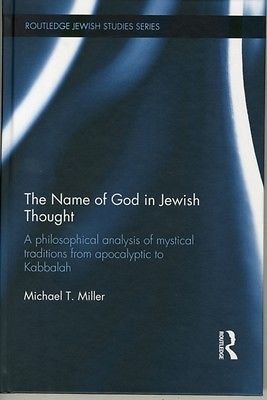

Most ebook files are in PDF format, so you can easily read them using various software such as Foxit Reader or directly on the Google Chrome browser.
Some ebook files are released by publishers in other formats such as .awz, .mobi, .epub, .fb2, etc. You may need to install specific software to read these formats on mobile/PC, such as Calibre.
Please read the tutorial at this link: https://ebookbell.com/faq
We offer FREE conversion to the popular formats you request; however, this may take some time. Therefore, right after payment, please email us, and we will try to provide the service as quickly as possible.
For some exceptional file formats or broken links (if any), please refrain from opening any disputes. Instead, email us first, and we will try to assist within a maximum of 6 hours.
EbookBell Team

4.7
66 reviewsOne of the most powerful traditions of the Jewish fascination with language is that of the Name. Indeed, the Jewish mystical tradition would seem a two millennia long meditation on the nature of name in relation to object, and how name mediates between subject and object. Even within the tide of the 20th century’s linguistic turn, the aspect most notable in – the almost entirely secular - Jewish philosophers is that of the personal name, here given pivotal importance in the articulation of human relationships and dialogue.
The Name of God in Jewish Thought examines the texts of Judaism pertaining to the Name of God, offering a philosophical analysis of these as a means of understanding the metaphysical role of the name generally, in terms of its relationship with identity. The book begins with the formation of rabbinic Judaism in Late Antiquity, travelling through the development of the motif into the Medieval Kabbalah, where the Name reaches its grandest and most systematic statement – and the one which has most helped to form the ideas of Jewish philosophers in the 20th and 21st Century. This investigation will highlight certain metaphysical ideas which have developed within Judaism from the Biblical sources, and which present a direct challenge to the paradigms of western philosophy. Thus a grander subtext is a criticism of the Greek metaphysics of being which the west has inherited, and which Jewish philosophers often subject to challenges of varying subtlety; it is these philosophers who often place a peculiar emphasis on the personal name, and this emphasis depends on the historical influence of the Jewish metaphysical tradition of the Name of God.
Providing a comprehensive description of historical aspects of Jewish Name-Theology, this book also offers new ways of thinking about subjectivity and ontology through its original approach to the nature of the name, combining philosophy with text-critical analysis. As such, it is an essential resource for students and scholars of Jewish Studies, Philosophy and Religion.